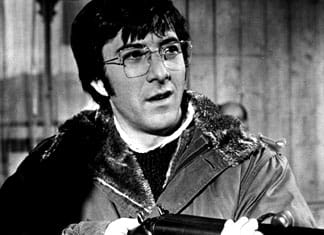This 1971 film is every pacifist's worst nightmare, one that would send Gandhi into a moral quandary. Dustin Hoffman plays a mild-mannered mathematician who flees the societal strife of late '60s America, ending up in his British wife's rural hometown. There he finds himself the suspicious outsider, both to the locals and to his increasingly estranged spouse, who regresses to the level of an attention-seeking child as he isolates her further with academic distance and patriarchal condescension. When confronted, he cowers, his policies of appeasement and diplomacy resulting in impotence. He's so wishy-washy that they should have made the character Canadian, not American. In the film's terrifying final half hour, he begins by bellowing, "I will not allow violence against this house!" Soon enough, his ethical stance quickly unravels into brute force once the barbarians are at his gates. This film, which was released the same month as Kubrick's A Clockwork Orange, was banned from video and DVD release by the British censors right up until 2002, and it has lost little of its ability to shock. The politically dubious rape scene is horrifying, due entirely to the strength of the actors and the foreboding, tightly-wound suspense of Peckinpah's pacing; apparently actress Susan George refused to allow the scene to be even more graphic than it is. Peckinpah's masochistic morality lesson about a man's breaking point has only two female characters one is braless, the other wears ridiculously short skirts and both of them are implicated in their own demise, with both demanding male attention and becoming helpless in the face of masculine aggression. There are no heroes (nor heroines) here, with Hoffman's character the subject of equal cheering and jeering. There is an older Criterion version of this film with scholarly commentary and a couple of documentaries; this cheaper version contains zero extras. But Straw Dogs' horrifying moral morass is so powerful that talking heads and contextualisation would only distract from drawing your own conclusions. (MGM)
Straw Dogs
Sam Peckinpah

BY Michael BarclayPublished Nov 1, 2004